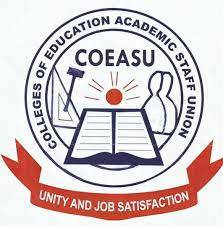The Colleges of Education Academic Staff Union has expressed reservation over the directive of the Federal Government that Federal Colleges of Education should remit 40% of their Internally Generated Revenues (IGR) to the Federal Treasury.
According to a statement by the COEASU President, Dr. Smart Olugbeko, there is no basis to apply this directive to the Colleges of Education because revenues collected in the Colleges are meagre charges meant for the discharge of specific services.
The Federal Colleges of Education do not generate IGR. What they charge are service charges for student identity cards, health clinic services, hostel maintenance, laboratory equipment, teaching practice, consumables,he said.
“It is necessary to note that the aforementioned charges cover for government inefficiency as these services are not being funded by government. Following the monetisation policy of 2003, Government basically stopped paying for outsourced services such as cleaning, grass-cutting, facility maintenance, and security, which are supposed to be government responsibilities.
“Government only gives the Federal Colleges between an average of N8 million monthly to run the Colleges and this fund is not always made available as and when due, creating serious challenges in running the institutions. Apart from the fact that this fund is grossly inadequate, Colleges of Education are not elitist schools, and they are not patronized by wards of the high and mighty in the society. They are schools for under-privileged but generally patriotic Nigerians who are ready to make the sacrifices to engender a positive change in the education sector.
“How many Nigeria ministers, governors or Chief Executive Officers of government parastatals have their children studying in a College of Education?
“Thus, our students come from modest backgrounds, but are committed Nigerians who are striving to improve the Nigerian education system and should not be made to pay a huge price for the sacrifices they make to the country.
Dr Olugbeko further stated that the recent report by the Joint Admissions and Matriculation Board (JAMB) that Education and Agriculture courses are the least subscribed among applicants to tertiary educational institutions is not only worrisome, but portends a counter-developmental trend in our education system.
“The Honourable Minister of Education, Professor Tahir Mamman, and the Honourable Minister of State for Education, Dr. Yusuf Sununu had on assumption of office hit the ground running by putting in place practical interventions to address this worrisome trend.
He said government by its new demand on Provosts to remit 40% of internally generated revenue will be giving the Provosts no other options but to increase fees payable by students in order to provide the aforementioned services thereby leading to many student-teachers dropping out.
” This is a country with over 12 million out-of-school children with the expectation by the stakeholders that the Education Road Map conceptualised by the Ministry of Education will help to resolve the critical situation.
“This otherwise innovative and brilliant approach on the part of the Federal Ministry of Education is already being threatened by the ill-conceived and retrogressive policy of 40% remittance to Government.
According to the COEASU President, this decision represents another strike against teacher education at a time when the critical stakeholders in the education sector are clamouring for increased funding of teacher education, provision of scholarships and bursaries for education students, government is initiating a policy to turn Colleges of Education into revenue-generating centres.
” While various tiers of government provide grants, scholarships, bursaries, and other incentives to students of Medicine, Law or Engineering and support them with stipends for housemanships, internships and industrial attachments, Education students are made to pay for Teaching Practice, and now the Colleges will now be required to remit portions of such payment. Take for instance, if government collects 40% of charges for Teaching Practice exercise, how will the colleges produce the logbooks, lesson notes, assessment notes and pay for the external moderation of the exercise? If government collects 40% of charges for hostel maintenance, how will the colleges carry out repairs, supply electricity, water etc to the hostels?
“The minimum amount most Federal Colleges of Education spend on electricity is N10m monthly and governments gives a total average sum of N8million to run the institutions monthly. We expect government to understand the implications of inability of colleges to provide electricity, pipe-borne water, security, laboratory equipment and other relevant recurrent mainteinance costs as this will lead to ineffective teaching and learning, and ultimately, students unrest.
“We believe some people hide somewhere, churning out obnoxious policies to make sure this country does not make progress. If not, how would a government that does not adequately fund tertiary institutions be expecting the same institutions to be transmuted into revenue-generated avenues for it? We believe those who conceived this policy deliberately want to sabotage this government.
“If government goes ahead to implement this policy, parents will bear the consequences and many parents will withdraw their children from schools.
The Union however urged the Federal Government to exclude Colleges of Education from remitting 40% of their IGR to the federal treasury as collections made by the Colleges are not IGR per se, but charges meant to support specific services that are not being provided by Government.
Olugbeko further made case for the Federal Government to improve its funding of Colleges of Education as this is a constitutional obligation of social responsibility.



